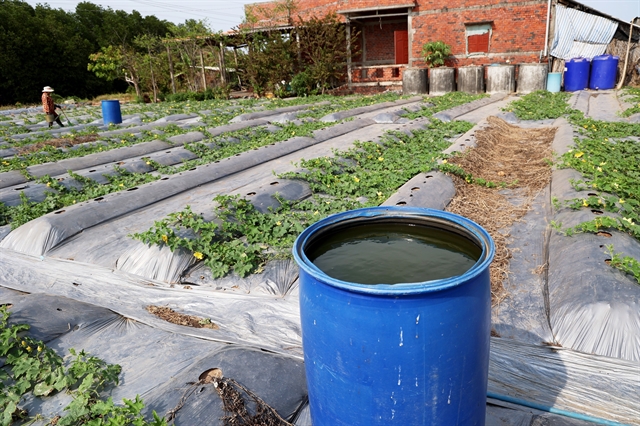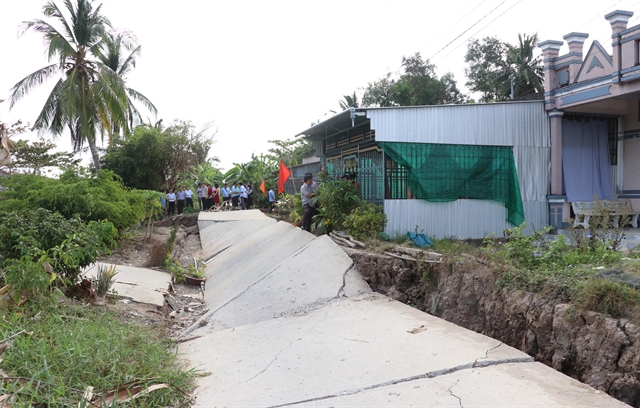 Environment
Environment

 |
| Barrels used to store fresh water for a vegetable garden in Bến Tre Province. — VNA/VNS Photo Hồng Đạt |
CÀ MAU/BẾN TRE — The Ministry of Agriculture and Development (MARD) is weighing options to deliver water to the Mekong Delta, as the region suffers from increasing impacts of drought and saline intrusion.
The phenomena are reaching their peak in the dry season this year, according to the ministry.
Ulike other localities in the area, the southernmost Cà Mau Province has no alternative water supply and can only store water on site.
According to Deputy Minister of Agriculture and Rural Development Nguyễn Hoàng Hiệp, authorities are considering building a pound lock to prevent saltwater from the sea, followed by plans to deliver water from nearby areas to Cà Mau.
Hiệp emphasised that water delivery to Cà Mau is completely feasible and must be done.
However, the cost of the project must be taken into account, and Cà Mau may have to switch its agriculture production to higher-value crops.
Field surveys conducted by the MARD show that Cà Mau’s Trần Văn Thời District is suffering from severe subsidence, which is mainly due to people storing fresh water for production and daily activities.
The province has recorded virtually zero rainfall from the beginning of the year. The intense heat also accelerates water evaporation leading to drought and land subsidence in the fields.
In the face of these challenges, the MARD has recommended limiting traffic, especially heavy-duty vehicles on routes along canals and ditches.
Water storage must be spread out across the locality to facilitate additional water supply from nearby production areas.
The ministry also suggested that Cà Mau change its agricultural production cycle from two rice crops per year to one rice and one shrimp crop.
In this way, farmers can take advantage of the salinity and drought season for shrimp farming to ensure production and reduce subsidence.
 |
| Land subsidence in Cà Mau Province due to severe drought. —VNA/VNS Photo Huỳnh Anh |
Working with Bến Tre authorities, the MARD is also proposed to direct water flows from Đồng Nai River to Bến Tre and Tiền Giang provinces.
Deputy minister Hiệp said: “We have been looking into this option, but it’s currently impossible to direct the flows from Đồng Nai River to Bến Tre at the moment.
“This is because while the Đồng Nai River basin already has Dầu Tiếng and Phước Hòa irrigation systems, it still records a shortage of 5 billion cubic metres of water per year.”
Other construction projects are underway to provide adequate water for daily activities and production in Bến Tre Province.
A water management project, named JICA3, funded by the Japanese government will be executed by the MARD from around the end of 2024 to the end of 2025.
The project aims to equip Bến Tre with large-scale constructions to store fresh water. Medium-term public investment capital will also be used for water construction in the southern part of the province.
Deputy minister Hiệp emphasised that the planning for natural disaster prevention, control and irrigation for the 2021-30 period with a vision to 2050 was among the 38 specialised national plans approved by the Prime Minister.
"In infrastructure development, irrigation systems play an important role and can even contribute to mitigating natural phenomena such as drought, subsidence and saline intrusion, especially when Việt Nam is increasingly affected by climate change," he added.
“Drought and saline intrusion in the Mekong Delta is part of the recurrent phenomena often observed in coastal areas, but they are happening sooner, longer and more intense than before.
“If irrigation planning is done well, with construction and non-construction solutions carried out, I believe we can minimise the damage,” said Hiệp. — VNS




